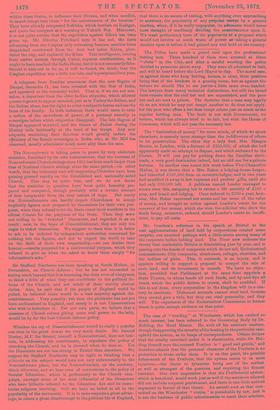Whether the cry of Disestablishment would be really a popular
one even in the great towns we very much doubt. Mr. Samuel Morley, M.P. for Bristol, himself a Nonconformist, does not hesi- tate, in addressing his constituents, to repudiate the policy of attacking the Church, and he is cheered when he does so. Yet the Dissenters are not less strong in Bristol than elsewhere. We suspect Sir Stafford Northcote may be right in thinking that a plebiscite on the subject would turn out very unfavourably to the Nonconformist plans, but the Nonconformists, on the contrary, think otherwise, and we hear even of conversions to the policy of Secular Education, which is preliminary to the Church cam- paign, amongst some of the most influential of the Dissenters who have hitherto adhered to the Education Act and its unsec- tarian religious teaching. Still we have no belief at all in the popularity of the movement. It is in some respects a great advan- tage, in others a great disadvantage to the political life of England, that there is no means of testing, with anything even approaching to accuracy, the popularity of any proposal except by a general election, when, if it be really unpopular, its advocates would never have thought of needlessly dividing the constituencies upon it. We want preliminary tests of the popularity of a proposal which would not involve so much waste of power ae-taking a general election upon it before it had gained any real hold on the country_


































 Previous page
Previous page